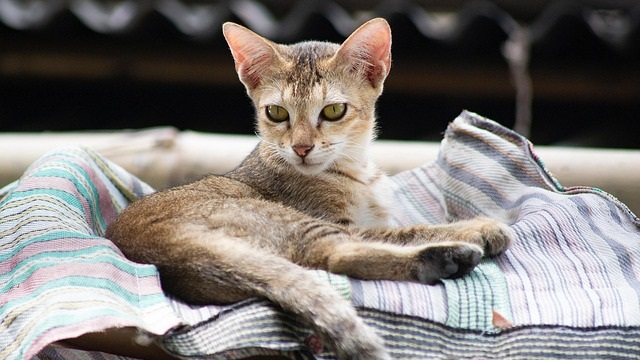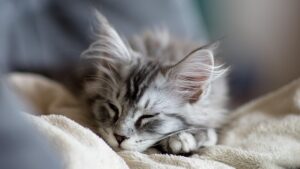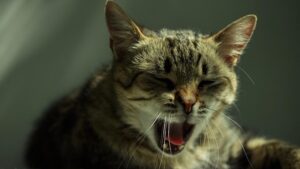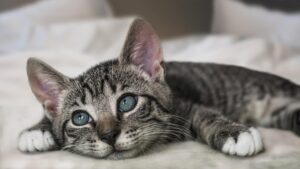Why Is My Cat Losing Weight? Common Causes and Solutions (Vet Verified)
Is your cat getting thinner? If you’re wondering “why is my cat losing weight?”, you’re probably becoming concerned. And rightfully so.
A cat’s weight loss is rarely a result of a new exercise routine or a passing appetite change. For cats, weight loss is often a significant indicator of a health problem.Today, we’re going to look at the most common reasons a cat loses weight, provide clear, vet-backed advice on when to seek help, and how a pet health tracker can help you take better care of your four-legged friend.
Key Takeaways
- Unexplained weight loss in a cat is a serious symptom that should never be ignored.
- Causes range from metabolic diseases to gastrointestinal issues, dental problems, and cancer.
- If your cat is losing weight but still eating, it may indicate a problem with their ability to absorb or process nutrients.
- Weight loss in older cats is not normal and can be a sign of age-related issues.
- An immediate vet visit is crucial for early detection and treatment.
Why Is My Cat Losing Weight?
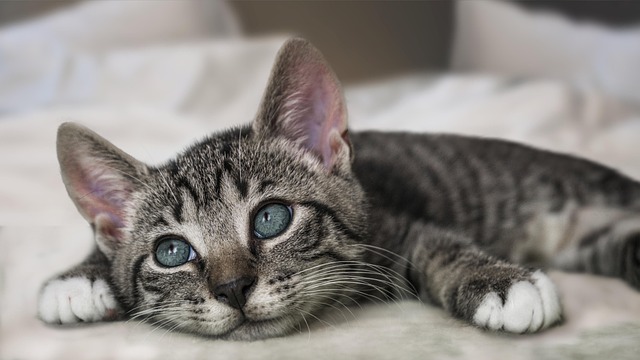
A cat is considered to be losing weight when they experience a decrease of 10% or more of their body weight.
Because cats are skilled at hiding illness, weight loss may be the first and only visible symptom of a developing health condition.
The most common reasons for unexplained weight loss in cats include:
- Hyperthyroidism
- Diabetes
- Chronic kidney disease (CKD)
- Cancer
- Gastrointestinal problems
- Dental disease
- Internal parasites
Why Is My Cat Losing Weight but Still Eating?
This specific scenario is a key red flag that often points to a metabolic or systemic issue.
When a cat eats normally but still loses weight, it suggests their body is unable to utilize the nutrients it’s receiving.
This is usually caused by health problems that require vet attention.
“Every time Umi is hospitalized, it’s for like four days and it costs over $5,000… Maven has helped me not only save money but also save his life”
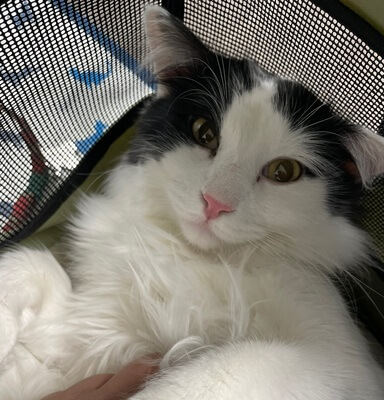
★★★★★
Jessica Ortiz
Umi
Why Is My Older Cat Losing Weight?
It’s a common misconception that weight loss is a normal part of aging in cats.
Significant or sudden weight loss should always be a cause for concern, even in senior cats. Many age-related illnesses in cats manifest with weight loss as a primary symptom.
Why Is My Cat Losing Hair and Weight?
When weight loss is accompanied by hair loss or a poor coat condition, it strongly suggests a systemic illness affecting multiple bodily systems.
In this case, the reasons can go from the classic hyperthyroidism to skin issues or even internal parasites, which means a trip to the vet is necessary.
When Weight Loss Signals a Medical Emergency
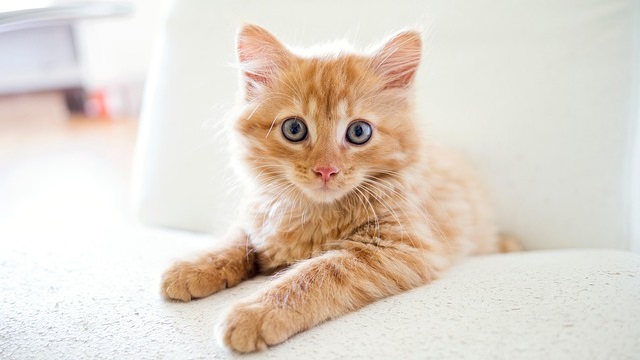
While any unexplained weight loss warrants a vet visit, you should seek urgent care if your cat also has any of the following symptoms:
- Rapid or sudden weight loss (more than 1-2 pounds)
- Complete lack of appetite for more than 24 hours
- Persistent vomiting or diarrhea
- Unusual changes in urination or thirst
- Lethargy, weakness, or hiding
- Difficulty breathing or collapse
How Vets Diagnose the Cause
“Unexplained weight loss in cats is always a red flag. Even if your cat is eating normally, it can point to conditions like thyroid disease, diabetes, or kidney problems that need early treatment.” — Joana Babo, DVM, Veterinarian at Maven Pet
When you take your cat to the vet, they will start with a thorough physical exam, including a precise weigh-in. They will ask detailed questions about your cat’s diet, appetite, and any other symptoms you’ve noticed.
To pinpoint the cause, the vet will likely recommend diagnostics, which may include:
- A complete blood work that provides crucial information about kidney and liver function, blood sugar levels, and thyroid hormone levels.
- Urinalysis to help diagnose diabetes and chronic kidney disease.
- Fecal exam to check for intestinal parasites.
- X-rays or an ultrasound to look for tumors, foreign objects, or other abnormalities.
How the Maven Pet Health Monitor Helps Track Behavior and Health Patterns
In the early stages of a health issue, a cat’s weight may only decrease slightly, and other symptoms can be subtle.
A cat health tracker like the Maven Pet Health Monitor can provide an objective record of your cat’s habits, which can be crucial for a vet.
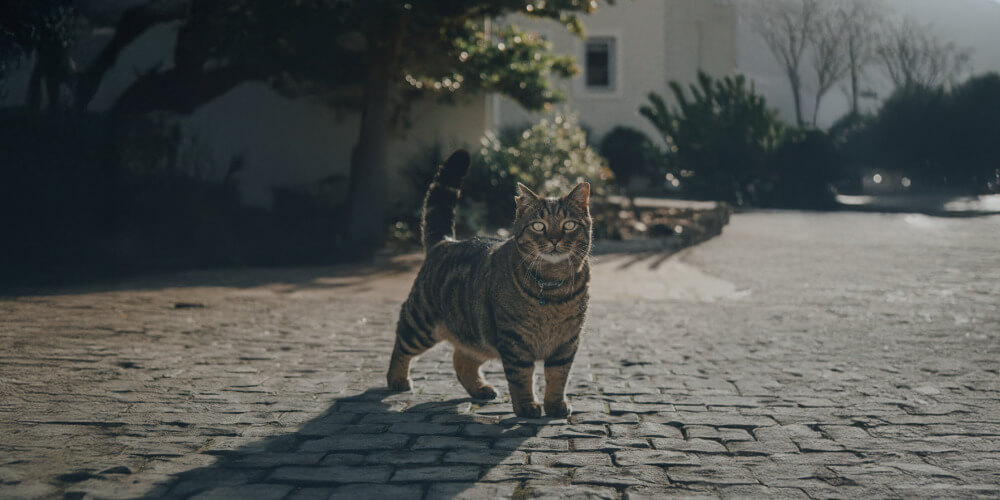
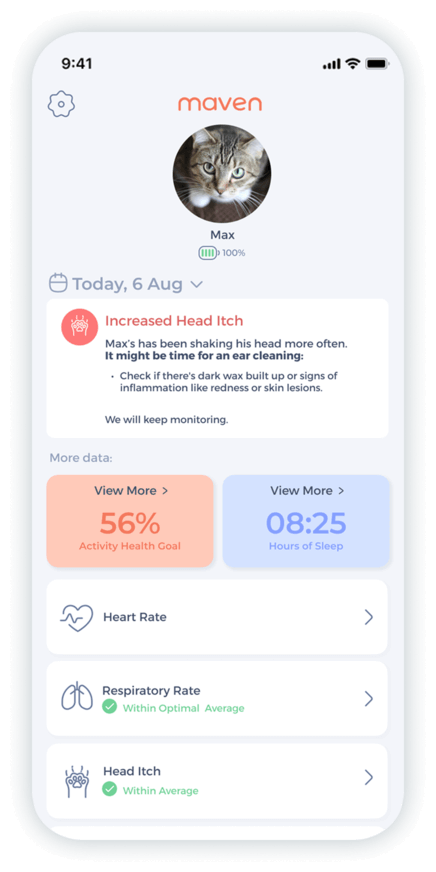
Monitor heart rate, respiratory rate, activity & rest, itch behavior.
By tracking your cat’s health data, you can provide your vet with insights into:
- Activity levels: A cat with hyperthyroidism may be highly active, while a cat with kidney disease may show a decrease in activity.
- Sleep patterns: A sudden change in how long or how often your cat rests can be a subtle sign of illness.
- Restlessness: Increased restlessness, especially at night, can be a symptom of conditions like hyperthyroidism.
Using a pet monitor can help you notice these minor behavioral changes before they escalate, providing your vet with the full picture for an accurate diagnosis and effective treatment plan.
Takeaways Recap
- Weight loss is a significant symptom in cats that should never be dismissed as normal.
- Look for other signs like changes in appetite, thirst, and coat condition to help pinpoint the cause.
- Always consult a vet if you notice unexplained weight loss, especially in senior cats or if it’s accompanied by other worrying symptoms.
- Use a pet health app to get objective data that helps you and your vet detect illnesses in their earliest, most treatable stages.
Maven Pet focuses on improving the quality of life of our pets with technology, using artificial intelligence (AI) to enable proactive pet care. By accurately collecting and monitoring pet data 24/7 and flagging any irregularities, Maven Pet empowers pet parents and veterinarians to stay ahead of potential health issues, ensuring the well-being and longevity of our beloved companions.

